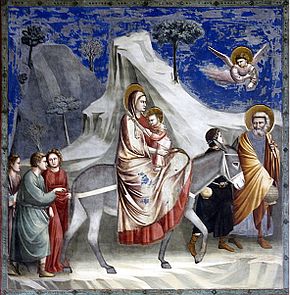Ricochet is the best place on the internet to discuss the issues of the day, either through commenting on posts or writing your own for our active and dynamic community in a fully moderated environment. In addition, the Ricochet Audio Network offers over 50 original podcasts with new episodes released every day.
 Filling Up Prophecy
Filling Up Prophecy
 Something kinda weird happens in the aftermath of the Christmas story. Here’s Matthew 2:15. (All quotes in the ESV.)
Something kinda weird happens in the aftermath of the Christmas story. Here’s Matthew 2:15. (All quotes in the ESV.)
This was to fulfill what the Lord had spoken by the prophet, “Out of Egypt I called my son.”
A prophecy was fulfilled; it hadn’t been fulfilled until that moment in history, and now it was fulfilled. Seems straightforward enough, right?
Except that Matthew is quoting from Hoseah in the Old Testament prophets, Hoseah 11:1:
When Israel was a child, I loved him, and out of Egypt I called my son.
Hoseah is obviously looking back to the Exodus. So why does Matthew say he was making a prediction about the future? One possible theory is that Matthew is just wrong; he doesn’t even know what Hoseah was talking about.
A slightly better theory is that he doesn’t care. He’s talking about something else; he’s finding some new meaning that wasn’t there before.
A much better theory is that Matthew thinks the verse in Hoseah originally means two different things–one looking back to the Exodus, the other looking forward to the coming of the Messiah.

That theory is probably the best we can do if we just keep reading this thing in English. But the original was written in Greek. Here’s what it looks like in the original. Notice the key word, πληρόω/ plehroo. (That’s two syllables for the letters O, one long, one short–play-ro-oh.) This word can be translated as “fulfill,” but it’s better translated as “complete” or “make full” or “fill up.” (In Matthew 14:20, the related adjective πλήρης/plehrehs is used to describe baskets full of leftovers after a nice meal.)
That explains what Matthew is saying about the verse in Hoseah. He’s not stupid–he knows what it means. And he’s not impious–he cares about what the prophets said. He just thinks the original sense of the holy Scriptures–while important, accurate, and indeed the very Word of G-d–is made full in its pointing to the Messiah.
In Matthew 3:3, the verb is a simple “is.” This John the Baptist/John the Forerunner chap simple is the fulfillment of the prophecy to which Matthew refers there, a passage in Isaiah where the old meaning would not have been true at all without John’s coming. But things are different with Hoseah 11:1, as well as with the prophecies mentioned in Matthew 1:22 and Matthew 2:17, where the verb πληρόω is also used. In those prophecies, there was an original meaning that was true enough without Jesus coming first.
It was true, but it was not full without the coming of Messiah.
It’s probably better not to say that Hoseah 11:1 has two meanings, but to say that it has one meaning which Matthew is expecting us to recognize, and that its meaning comes into its fullness only when Messiah comes.
 And what else would we expect? The Christmas story and the story of the death and resurrection of Jesus the Messiah already repeat the Old Testament in any number of ways. A miracle baby is born to a couple too old to have children. A son is born as a sign that God’s people will be redeemed. Someone named Yeshua will lead God’s people into enjoyment of the blessings promised to Abraham. A shepherd-king comes out of Bethlehem. A wicked king tries to kill all the male babies, but one escapes, one through whom redemption will come to God’s people. God speaks through dreams to a man named Joseph, the son of Jacob, who comes to Egypt for the redemption of God’s people. The seed of the woman defeats Satan. A holy God must punish sin, but people can be saved through the wooden way God provides. God tells his people how a lamb may die in their place for their sin. A prophet is in darkness for three days; his message is a light to the Gentiles, a preaching of repentance and forgiveness of sins for them.
And what else would we expect? The Christmas story and the story of the death and resurrection of Jesus the Messiah already repeat the Old Testament in any number of ways. A miracle baby is born to a couple too old to have children. A son is born as a sign that God’s people will be redeemed. Someone named Yeshua will lead God’s people into enjoyment of the blessings promised to Abraham. A shepherd-king comes out of Bethlehem. A wicked king tries to kill all the male babies, but one escapes, one through whom redemption will come to God’s people. God speaks through dreams to a man named Joseph, the son of Jacob, who comes to Egypt for the redemption of God’s people. The seed of the woman defeats Satan. A holy God must punish sin, but people can be saved through the wooden way God provides. God tells his people how a lamb may die in their place for their sin. A prophet is in darkness for three days; his message is a light to the Gentiles, a preaching of repentance and forgiveness of sins for them.
Merry Christmas, everyone!
Published in Religion & Philosophy



Presumably also in Matthew 4:14, though I’m none too sure what original meaning was true enough without Jesus coming.
Some of us who think we tend to take words literally should have been paying closer attention.
This is good. Thank you.
There is another set of passages that have always bothered me because they are in the readings on the same day (if I remember correctly).
The first is Isaiah 40:3
The second is Mark 1:3
How do they get away with moving the break. Is the way being prepared in the desert as Isaiah says or being proclaimed in the desert as Mark says?
I don’t know Hebrew, although I suppose I am capable of at least checking the Old Testament Septuagint Greek and the New Testament Greek there.
Without modern punctuation, I would guess it’s ambiguous in both texts. So both translations would be equally acceptable.
Well, they didn’t even put spaces between words (Colleen McCullough gives credit for that to Caesar, who knows if that is correct) so who knows about commas or colons.
Years ago, my pastor told me that prophecy is often not a matter of either-or, but of both-and. I like your clarification of this quality of prophecy
Manuscripts far younger than Caesar run the words together as a matter of course. If Caesar introduced spaces, it didn’t catch on at the time. And punctuation was a rare thing, as well. As for interpreting scripture, ancient commentaries are probably the best guide.
Our perception of time isn’t – can’t be – the same as God’s.
Don’t make me get all Augustine up in here.
This makes sense and it’s been something I’ve wondered about for a while. Thanks!
Thank you for this. I knew that many (most?) of the Church Fathers tended to be more… expansive around interpreting prophecy than we enlightened moderns are comfortable with. And to be honest, I’ve had difficulty appreciating the Fathers’ point of view. You explanation here really helps.
If you don’t mind, please explain this:
Why wooden? I suppose it refers to the Cross in the one sense, but what is the Old Testament sense? Or is that a typo?
Noah’s Ark.
Aaaaah wonderful. Thank you.
What it says or means is nothing to me, of course, but the human tendency to find invisible things that are hidden in words or symbols to bolster their politics or beliefs clearly has been a trait we’ve had for a very long time.
Here endeth the lesson.
Beautiful. Merry Christmas.
And this has what to do with Christianity?
Because biblical texts that have plain meanings are reinterpreted to mean something entirely different in order to create a mystical connection. That’s what it has to do with Christianity.
Who does that?
And did you not notice that that’s the second bad theory to dispense with which was the whole point of this post?
You can dispense with it all you’d like.